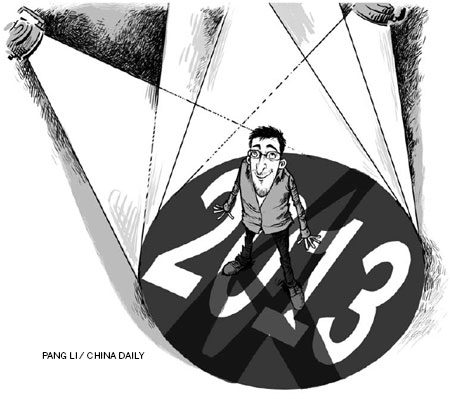Snowden the real of man of the year

Edward Snowden was for a while considered Time magazine's most likely candidate for "Person of the Year". In the end, however, the magazine's editors yielded the man-of-the-year slot to the Pope Francis, the third pontiff so named. It was a safe, if not a slyly calculated, choice because any pope has millions of cheering followers and a pro-active one, such as the current pope, will have many millions more.
Snowden, for the uninitiated, is a former National Security Agency operative who exposed the United States' global surveillance program.
It is said Snowden came in second, another sly bit of PR finesse, because it speaks to popular sentiment of the moment, implying the rogue patriot actually stood a chance at snagging the top spot, while easing fears in the Beltway, where the NSA's nervous ninnies can console themselves with the hope that runners-up for such accolades are soon forgotten. Who was the runner up last year?
Over the years, Time has made some strange decisions, flipping back and forth between the safely mainstream and flippantly in-your-face choices. Former US president Richard Nixon got the nod twice, ditto for current US President Barack Obama, and so did Deng Xiaoping, honored in 1978 and again in 1985, something proudly pointed out to me on a wall display when I visited the Time bureau in Beijing. The most controversial choice in modern times was Ayatollah Khomeini in 1979; the backlash was so ferocious that Time's choices have been fairly anodyne ever since.
Of course, Snowden doesn't need validation from the US mainstream media. In fact, he has taught us to be suspicious, very suspicious of it because so much of the media is in bed with the government.
Not for nothing did the intelligence-savvy Snowden specifically refuse to deal with The New York Times. The dear old "Gray Lady" has a track record of being the handmaiden to the powers that be, a harridan cheerleader for war (Syria being the latest example, Iraq another) and is quick to dissemble and kill, or at least maim a news story if the authorities want it that way - the case of the CIA agent abandoned in Iran for seven years being just a recent example. Thanks to AP News, we know about this. No thanks to the whining, finger-pointing "Gray Lady" that dishes out scorn and criticism on others but can't stand the heat of the kitchen.
Snowden's soft-spoken contribution to helping Americans and the world become aware of how unfettered US spying poses an existential threat to democracy is a gift that keeps on giving. Through the dogged, determined and amiably combative Glenn Greenwald, who broke the Snowden story in The Guardian, we learn something revelatory, often shocking, nearly every week as the voluminous files are vetted and prepped with journalistic diligence.
Snowden is an unlikely hero, a techie and geek who wanted to do something for the US in the wake of the Sept 11, 2001, attacks and, as his history of Internet chats suggests, until recently, politically conservative. This cautious and prudent young man considered trying to correct what he saw as a broken system from within, but seeing how other whistleblowers were pilloried by the government and spurned by the press gave him pause. He collected information quietly, using spy-craft learned on the job to cover his tracks, until he had, by some estimates, over 1 million sensitive documents.
In May, Snowden made a mad dash for Hong Kong, putting himself at risk in a way that still has analysts scratching their heads. Why Hong Kong?
Once ensconced in a Kowloon hotel he contacted journalists and privacy advocates who he had long admired from afar, including Greenwald and filmmaker Laura Poitras. They broke the scoop of the year in The Guardian, which named Snowden its "Person of the Year".
Readers around the world were surprised at Snowden's youth, amazed at the value of his loot, and taken aback by his apparent lack of a getaway plan.
There was a modest groundswell of support for Snowden in Hong Kong, but to be safe from the long arm of American law, he booked a flight to Moscow with help from Wikileaks. Hong Kong's refusal to detain him at the airport, though couched in diplomatic language, was a small victory for standing up to US pressure, which under an agitated Obama was turning into something of a full court press.
Snowden holed up in Moscow airport's "sterile zone" for 39 days until an entry into Russia could be arranged. Bereft of his earth-shaking thumb drives, he presumably had little to offer his hosts other than an opportunity to say no to arrogant US arm-twisting.
As University of Michigan professor Juan Cole, himself a victim of White House spying during the war in Iraq, has written, Snowden's revelations make Orwell's 1984 "look like a lackadaisical libertarian paradise" and Obama's complaisance makes him look like a front man "for an octopus-like secret government".
Snowden has changed our understanding of how governments actually work, especially the "Five Eyes" governments who collaboratively spy on everyone all the time without legal safeguards, while solemnly invoking an Anglo-Saxon axis in the name of democracy, dissent and right to privacy.
The author is a visiting research fellow, Cornell University, New York.
























